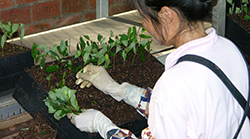Investments in SFM, reforestation and restoration crucial for green economic development, says Executive Director
27 March 2018

Nursery work in Guangxi, China. Investments in SFM, reforestation and restoration are crucial for developing the green economy, according to ITTO’s Executive Director. Photo: G. Dieterle/ITTO
“SFM, efficient timber production, and a transparent and equitable timber trade are key to the development of green economies, conserving the world’s remaining tropical forests, and ensuring the ongoing provision of public goods and services. Moreover, investments in forestry would also open up opportunities for green economic growth and industrialization in other sectors”, said Dieterle.
In his remarks to forum participants, Dr Dieterle mentioned that tropical timber-producing economies needed to maintain and scale up efforts in good governance, legality and sustainability to retain and advance their positions in international timber markets and grow the green economy. Legal and sustainable domestic and intraregional timber trade in the tropics and deforestation-free supply chains are crucial for ensuring that forests are properly valued, said Dr Dieterle, and consumer markets have a role to play in pushing these forward. There was also a need to look outside the forest to address perverse incentives in other sectors and for a policy environment that would increase the competitiveness of “good” forestry players.
Dr Dieterle urged the international community to pay more attention to forest degradation—which may account for as much as 69% of greenhouse gas emissions in the tropics—and to craft adequate policies to address the issue.
Dr Dieterle offered ITTO’s expertise in realizing the potential of forests in achieving the Sustainable Development Goals by building capacity in governance and “green” timber supply chains, including the development of appropriate policy frameworks, timber tracking, criteria and indicators for SFM, timber procurement policies, and matching timber demand and supply.
Dr Dieterle said that, if conditions are established to foster investments in tropical forestry, forests had the potential to contribute up to 8 gigatonnes of carbon dioxide sequestration per year.
“Green development in tropical countries is also in the interest of consumer countries as it creates employment, fosters stability, protects biodiversity, mitigates climate change, and reduce poverty and migration,” said Dr Dieterle.